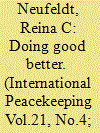| Srl | Item |
| 1 |
ID:
134779


|
|
|
|
|
| Summary/Abstract |
This article explores the ethics of peacebuilding. It argues that the perspectives of two moral theories currently dominate peacebuilding discourse: duty-based and consequentialist thinking. While these moral theory perspectives possess merits there are also important limits, which are particularly important for peacebuilding. The article argues that if peacebuilding is genuinely to contribute to collective flourishing then we need to recognize and act upon a more holistic ethics of peacebuilding practice. Considerations drawn from ethics of care and virtue ethics are therefore proposed to expand considerations of what constitutes ‘good’ and ‘right’ within peacebuilding interventions.
|
|
|
|
|
|
|
|
|
|
|
|
|
|
|
|
| 2 |
ID:
115200


|
|
|
|
|
| Publication |
2012.
|
| Summary/Abstract |
This essay engages critically with the recent emergence of "political realism" in political theory (centrally in the work of Raymond Geuss and Bernard Williams). While sympathetic to and convinced of the importance of the core of the enterprise which it identifies, the essay is critical of some of the claims made about the independence of politics from morality and the historically contingent character of political values, and suggests that realism may itself succumb to illusion. The final section sketches an account of the nature of evaluative judgment in the study of politics and, in conclusion, defends both the pluralist character of political theory and the pressing importance of the questions that realism raises and that are inadequately attended to by the bulk of post-war political theory.
|
|
|
|
|
|
|
|
|
|
|
|
|
|
|
|
| 3 |
ID:
164440


|
|
|
|
|
| Summary/Abstract |
What is a Classical Realist analysis of climate ethics and politics? Classical Realist ethical analysis differs from ideal normative theory in that it addresses state decision-makers rather than individuals, assumes highly imperfect compliance with the demands of justice, and is concerned with feasibility and transition rather than end-states. Classical Realists urge leaders to prioritise state security over private moral concerns, to assess rival policies against their likely consequences and to seek the ‘lesser evil’ among feasible choices. But how does Realism respond when the prudent pursuit of state security risks rendering much of the planet uninhabitable? In the 1950s, the development of the hydrogen bomb created just such a dilemma as status quo politics now carried a significant risk of thermonuclear omnicide. In response, Hans Morgenthau argued that states should manage systemic risk by working in concert to safeguard expanded, collective national interests. The Classical Realist mode of thought suggests an analogous response to systemic climate risks: states’ conceptions of national interest must expand to include cooperative system-preservation alongside traditional security concerns. Classical Realist arguments might then be mobilised to overcome resistance from vested interests and to support state-directed low carbon innovation, adaptation and mitigation agreements that prioritise ambition over distributional justice.
|
|
|
|
|
|
|
|
|
|
|
|
|
|
|
|